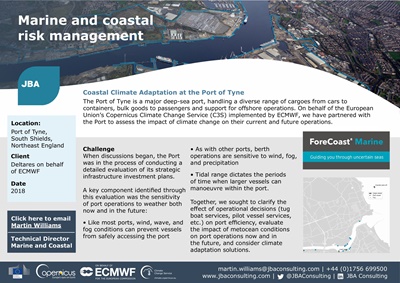
Coastal Climate Adaptation at the Port of Tyne
The Port of Tyne is a major deep-sea port, handling a diverse range of cargoes from cars to
containers, bulk goods to passengers and support for offshore operations. Under the auspices of the
EU Copernicus' Climate Change Service (C3S, implemented by the European Centre for Mediumrange
Weather Forecasting), we have partnered with the Port to assess the impact of climate change
on their current and future operations.
Location:
Port of Tyne,
South Shields,
Northeast England
Client
Deltares on behalf
of ECMWF
• As with other ports, berth
operations are sensitive to wind, fog,
and precipitation
• Tidal range dictates the periods
of time when larger vessels can
manoeuvre within the port.
Together, we sought to clarify the
effect of operational decisions (tug
boat services, pilot vessel services,
etc.) on port efficiency, evaluate
the impact of metocean conditions
on port operations now and in
the future, and consider climate
adaptation solutions.
Challenge
When discussions began, the Port
was in the process of conducting a
detailed evaluation of its strategic
infrastructure investment plans.
A key component identified through
this evaluation was the sensitivity
of port operations to weather both
now and in the future:
• Like most ports, wind, wave, and
fog conditions can prevent vessels
from safely accessing the port
Date
2018
martin.williams@jbaconsulting.com | +44 (0)1756 699500
www.jbaconsulting.com | @JBAConsulting | JBA Consulting
Marine and coastal
risk management
Click here to email
Martin Williams
Technical Director
Marine and Coastal